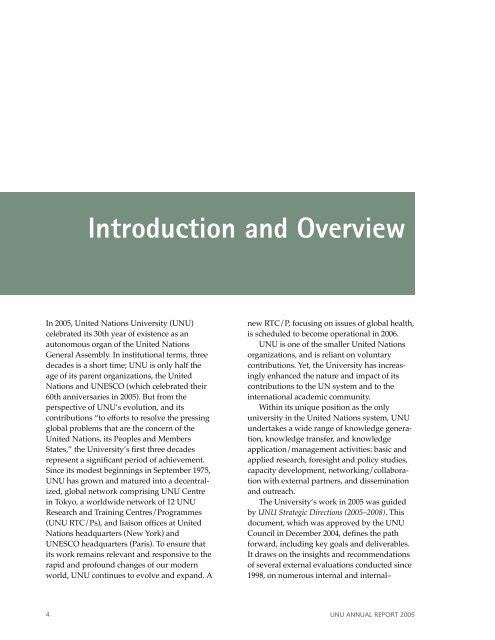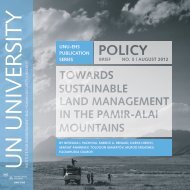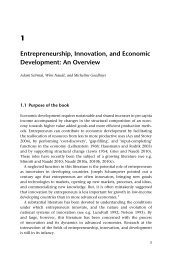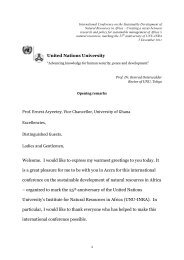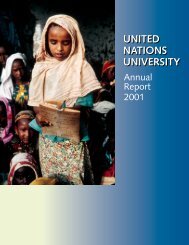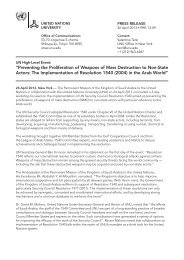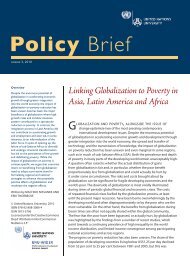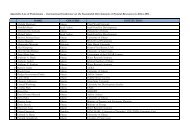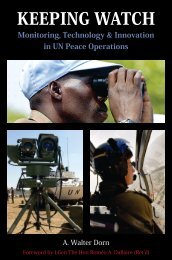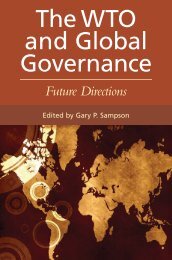Introduction and OverviewIn <strong>2005</strong>, <strong>United</strong> <strong>Nations</strong> <strong>University</strong> (<strong>UNU</strong>)celebrated its 30th year of existence as anautonomous organ of the <strong>United</strong> <strong>Nations</strong>General Assembly. In institutional terms, threedecades is a short time; <strong>UNU</strong> is only half theage of its parent organizations, the <strong>United</strong><strong>Nations</strong> and UNESCO (which celebrated their60th anniversaries in <strong>2005</strong>). But from theperspective of <strong>UNU</strong>’s evolution, and itscontributions “to efforts to resolve the pressingglobal problems that are the concern of the<strong>United</strong> <strong>Nations</strong>, its Peoples and MembersStates,” the <strong>University</strong>’s first three decadesrepresent a significant period of achievement.Since its modest beginnings in September 1975,<strong>UNU</strong> has grown and matured into a decentralized,global network comprising <strong>UNU</strong> Centrein Tokyo, a worldwide network of 12 <strong>UNU</strong>Research and Training Centres/Programmes(<strong>UNU</strong> RTC/Ps), and liaison offices at <strong>United</strong><strong>Nations</strong> headquarters (New York) andUNESCO headquarters (Paris). To ensure thatits work remains relevant and responsive to therapid and profound changes of our modernworld, <strong>UNU</strong> continues to evolve and expand. Anew RTC/P, focusing on issues of global health,is scheduled to become operational in 2006.<strong>UNU</strong> is one of the smaller <strong>United</strong> <strong>Nations</strong>organizations, and is reliant on voluntarycontributions. Yet, the <strong>University</strong> has increasinglyenhanced the nature and impact of itscontributions to the UN system and to theinternational academic community.Within its unique position as the onlyuniversity in the <strong>United</strong> <strong>Nations</strong> system, <strong>UNU</strong>undertakes a wide range of knowledge generation,knowledge transfer, and knowledgeapplication/management activities: basic andapplied research, foresight and policy studies,capacity development, networking/collaborationwith external partners, and disseminationand outreach.The <strong>University</strong>’s work in <strong>2005</strong> was guidedby <strong>UNU</strong> Strategic Directions (<strong>2005</strong>–2008). Thisdocument, which was approved by the <strong>UNU</strong>Council in December 2004, defines the pathforward, including key goals and deliverables.It draws on the insights and recommendationsof several external evaluations conducted since1998, on numerous internal and internal–4<strong>UNU</strong> ANNUAL REPORT <strong>2005</strong>
external discussions, as well as on the experiencegained in implementing the <strong>UNU</strong> StrategicPlan 2000 and <strong>UNU</strong> Strategic Plan 2002.An overview of this reportThis annual report presents a broad overviewof the work of <strong>UNU</strong> in <strong>2005</strong>. It does not attemptto provide an exhaustive inventory of the<strong>University</strong>’s operations and achievements, butrather offers a representative sampling of thegeographic and thematic scope of <strong>UNU</strong>’s work,highlights selected projects and other activitiesundertaken in <strong>2005</strong>, and acknowledges some ofthe partner institutions who collaborated with<strong>UNU</strong>. Additional information is availableonline at http://www.unu.edu.<strong>UNU</strong>’s thematic focuses — The “programmespace” within which <strong>UNU</strong> operates is definedby three variables: (a) the major processes thatare rapidly and profoundly changing ourworld, (b) the actors that are effecting thesechanges, while at the same time being affectedby them, and (c) the topics and themes mostrelevant to <strong>UNU</strong>’s mission. Within this programmespace, <strong>UNU</strong>’s activities are clusteredinto two broad programme areas — (i) Peaceand Governance and (ii) Environment andDevelopment — and further focused withinfive thematic areas: (a) Peace and Security;(b) Good Governance — From Local to Global;(c) Development and Poverty Reduction;(d) Environment and Sustainability; and(e) Science, Technology, and Society. Pages 8through 34 of this <strong>2005</strong> <strong>Annual</strong> <strong>Report</strong> introducea wide range of activities and accomplishmentswithin each of these five thematic areas,as well as selected activities that cut across orcomplement multiple themes.Capacity development — <strong>UNU</strong> is stronglycommitted to enhancing individual andinstitutional capacity, particularly in developingcountries. The <strong>University</strong> provides projectbaseddevelopment opportunities, specializedadvanced training programmes, and fellowships/internships;supports networkingactivities by developing country academics;and provides reimbursable financial aid forstudents from developing countries to attenda university in Japan. Specific capacity developmentprogrammes and courses offered in <strong>2005</strong>are listed in the relevant thematic sections,while the various types of capacity developmentopportunities supported by <strong>UNU</strong> arecovered on pages 35 through 37.Networking — The concept of networking isintegral to the work of <strong>UNU</strong>. The <strong>University</strong>complements its own internal network of RTC/Ps by reaching out to appropriate partnerinstitutions that share similar objectives and bycooperating with other UN system organizations.<strong>UNU</strong>’s networking activities in <strong>2005</strong> aresummarized on pages 38 through 42.Dissemination and outreach — Effectivecommunication — getting the “right” informationto those who need it, in a timely mannerand useful form — is crucial to the success of<strong>UNU</strong>’s work. The <strong>University</strong> disseminates theresults of its work through a variety of channels,including traditional print media, electronicmedia, and public events, andundertakes public and media relations activities.<strong>UNU</strong> dissemination and outreach activitiesfor <strong>2005</strong> are reviewed on pages 43 through 47.Resources — <strong>UNU</strong>’s human and financialresources are covered on pages 48 and 49.Other information — Appendix 1 lists themajor contributions received by <strong>UNU</strong> in <strong>2005</strong>,while appendix 2 introduces the members ofthe governing <strong>UNU</strong> Council. Additionalappendices — with data on <strong>UNU</strong> projects,training courses, fellows and interns, publicevents, publications, and more — are availableon the <strong>UNU</strong> website.INTRODUCTION AND OVERVIEW5


